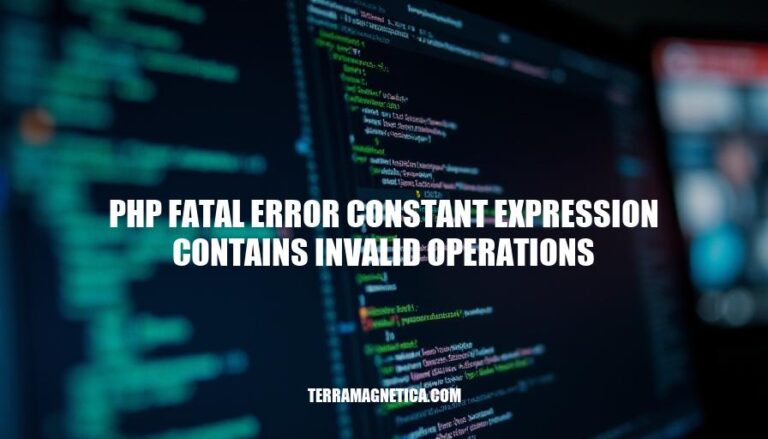


In PHP development, encountering the error “Fatal error: Constant expression contains invalid operations” can be perplexing. This error typically arises when a constant expression includes operations that PHP cannot evaluate at compile time, such as using non-constant values or performing certain calculations. Understanding this error is crucial for developers as it helps ensure that constants are defined correctly, leading to more stable and predictable code execution.
A PHP fatal error stating “constant expression contains invalid operations” means that a constant expression in your code includes operations that PHP cannot evaluate at compile time.
Example:
class Example {
const VALUE = 10;
const RESULT = self::VALUE * 2; // This will cause the error
}
In this example, self::VALUE * 2 is an invalid operation within a constant expression.
Here are some common scenarios that lead to the “PHP Fatal Error: Constant expression contains invalid operations” along with examples:
Using Non-Constant Values in Constant Expressions:
class Test {
const MY_CONSTANT = 'Value_' . $dynamicValue; // Error: $dynamicValue is not constant
}
Performing Operations Not Allowed in Constant Expressions:
class Test {
const MY_CONSTANT = strlen('test'); // Error: Function calls are not allowed
}
Referencing Class Constants Incorrectly:
class Test {
const VALUE = 10;
const DOUBLE_VALUE = self::VALUE * 2; // Error: Multiplication in constant expression
}
Using Arrays in Constant Expressions:
class Test {
const ARR = ['key' => 'value'];
const VALUE = self::ARR['key']; // Error: Array access in constant expression
}
Static Variables with Dynamic Values:
class Test {
protected static $dbname = 'mydb_' . $appdata['id']; // Error: $appdata['id'] is dynamic
}
These scenarios typically arise because PHP requires constant expressions to be fully resolvable at compile time, without any runtime evaluation.
Here are the steps to troubleshoot and resolve the “PHP Fatal Error: Constant expression contains invalid operations”:
Identify the Error Location:
Review the Code:
const or define.Check for Invalid Operations:
const MY_CONST = 5 * 2; is valid, but const MY_CONST = $var * 2; is not.Simplify the Expression:
Use Static Methods or Properties:
class MyClass {
public static $myVar = 10;
public static function getConstant() {
return self::$myVar * 2;
}
}
Test Incrementally:
By following these steps and tips, you can effectively troubleshoot and resolve the error.
To prevent the “PHP Fatal Error: Constant expression contains invalid operations,” consider these strategies:
Avoid Variable References in Constants:
const X = 10;
const Y = X + 5; // Invalid
Use Static Methods for Initialization:
class Example {
public static $value;
public static function init() {
self::$value = self::calculateValue();
}
private static function calculateValue() {
return 10 * 2;
}
}
Example::init();
Limit Operations in Constant Expressions:
const A = 10;
const B = A + 5; // Invalid
Use Define for Dynamic Values:
define() instead of const.define('X', 10);
define('Y', X + 5); // Valid
Static Properties for Complex Data:
class Config {
public static $settings = [
'key' => 'value'
];
}
Avoid Modifying Constants:
const X = 10;
X++; // Invalid
By adhering to these practices, you can avoid the “constant expression contains invalid operations” error and ensure your PHP code remains robust and maintainable.
define() for dynamic values that require computation.By adhering to these guidelines, you can prevent the “constant expression contains invalid operations” error and maintain robust and reliable PHP code. Proper coding techniques are essential to ensure your applications function correctly and efficiently.